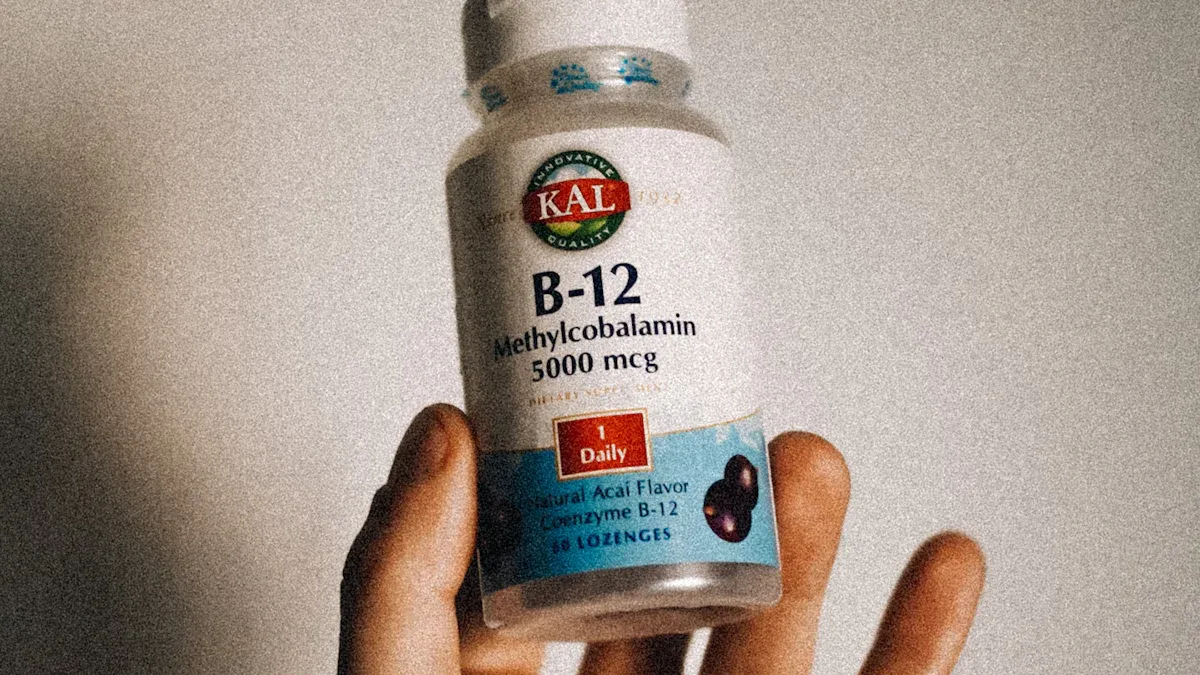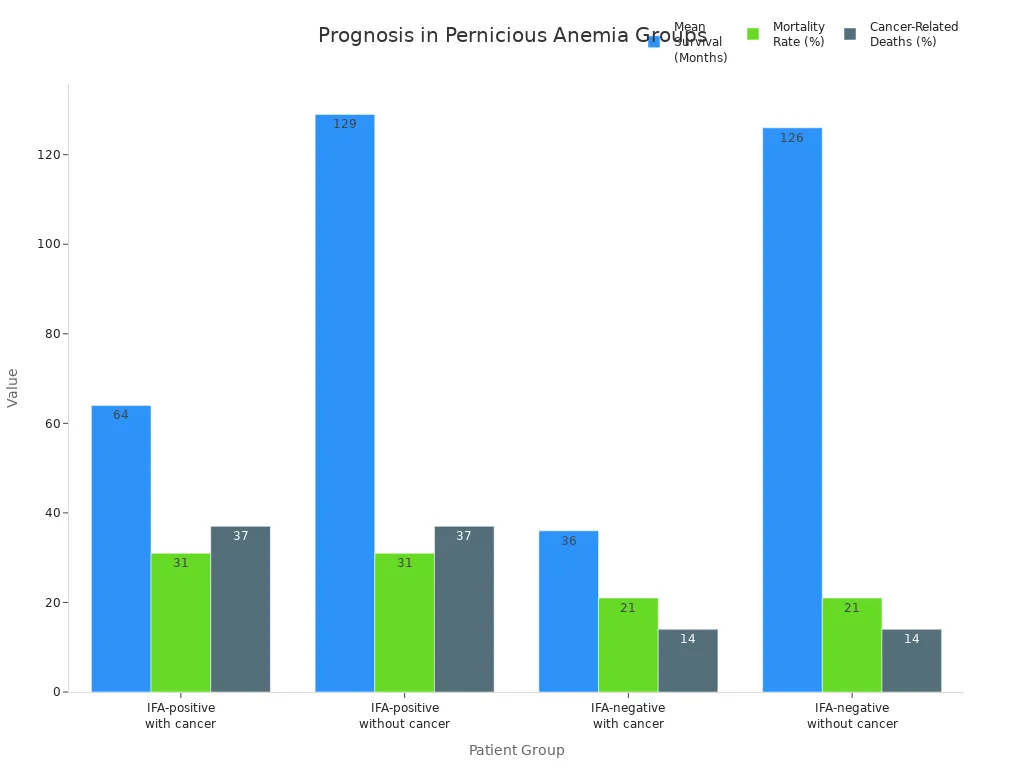News & Events
Intrinsic Factor Blocking Antibody Basics Everyone Should Know

You may hear your doctor talk about an intrinsic factor blocking antibody if you have trouble absorbing vitamin B12. This antibody can stop your body from using intrinsic factor, a protein that helps you take in vitamin B12 from food. Without enough vitamin B12, you might feel tired or weak. Doctors often check for this antibody when they suspect pernicious anemia.
Key Takeaways
- Intrinsic factor is essential for absorbing vitamin B12. Without it, your body struggles to get enough vitamin B12 from food.
- The intrinsic factor blocking antibody can prevent your body from using intrinsic factor. This can lead to low vitamin B12 levels and symptoms like tiredness and weakness.
- Testing for intrinsic factor blocking antibodies is crucial for diagnosing pernicious anemia. Early detection can help prevent serious health issues.
- If you test positive for this antibody, your doctor may recommend vitamin B12 injections instead of oral supplements. This ensures your body gets the vitamin it needs.
- Regular monitoring of vitamin B12 levels is important if you have this antibody. It helps prevent complications and supports your overall health.
What Is Intrinsic Factor?
Function in the Body
You may wonder what intrinsic factor does in your body. Intrinsic factor is a special protein that your stomach makes. Parietal cells in the fundus and body of your stomach produce intrinsic factor. This protein is not just floating around; it is present in your gastric juice and the lining of your stomach. Your body makes more intrinsic factor than you need each day. The gene for intrinsic factor sits on chromosome 11.
Here is a table that shows some important facts about intrinsic factor:
| Aspect | Details |
|---|---|
| Synthesis | Made by parietal cells in the stomach |
| Secretion | More is made than needed each day |
| Gene Location | Found on chromosome 11 |
| Glycan Composition | Contains 9.2–15% N-lactosaminic and O-glycosidic glycans |
| Binding Activity | Needs carboxyl terminus to bind vitamin B12 |
| Receptor Binding | Amino terminus helps it change shape for receptor binding |
| Cobalamin Interaction | May have a pocket for vitamin B12 |
Intrinsic factor works best at a pH of about 7. Its concentration does not depend on how much acid or pepsin your stomach makes. If you lose the carboxyl end of intrinsic factor, it cannot bind vitamin B12 anymore.
Role in Vitamin B12 Absorption
Intrinsic factor plays a key role in helping your body absorb vitamin B12. When you eat foods with vitamin B12, the vitamin first binds to R-binders from your saliva and stomach. If the vitamin is attached to protein in food, your stomach or duodenum breaks it free. In the duodenum, enzymes from your pancreas break down the R-binders. This step lets vitamin B12 attach to intrinsic factor.
Once vitamin B12 binds to intrinsic factor, the two travel together to the last part of your small intestine, called the ileum. Here, your body absorbs the vitamin B12-intrinsic factor complex. Without intrinsic factor, your body cannot absorb vitamin B12 well. If you do not have enough intrinsic factor, your plasma vitamin B12 levels can drop over time. Doctors have found that giving intrinsic factor to people with poor absorption helps them get more vitamin B12 from food.
Tip: If you have trouble absorbing vitamin B12, your doctor may check if you have enough intrinsic factor.
Intrinsic Factor Blocking Antibody
What It Is
You may hear your doctor mention the intrinsic factor blocking antibody if you have low vitamin B12 levels. This antibody is a special protein that your immune system makes by mistake. Instead of protecting you, it targets your own body. The intrinsic factor blocking antibody attaches to intrinsic factor, which is the protein in your stomach that helps you absorb vitamin B12. When this happens, your body cannot use intrinsic factor the right way.
Doctors often look for this blocking antibody when they think you might have a problem with vitamin B12 absorption. Many people with autoimmune gastritis or pernicious anemia have this antibody in their blood. In fact, studies show that more than half of patients with pernicious anemia have the intrinsic factor blocking antibody. This makes it a key clue for doctors.
Here are some important facts about how common this antibody is:
- In a study of 34 patients with pernicious anemia, 52% had the intrinsic factor blocking antibody.
- This means that if you have autoimmune gastritis, you have a high chance of having this blocking antibody.
- Doctors use this information to help diagnose certain health problems.
Note: The presence of the intrinsic factor blocking antibody does not always mean you will have symptoms right away. Sometimes, it takes years for problems to appear.
How It Affects Intrinsic Factor
The intrinsic factor blocking antibody changes how your body handles vitamin B12. When you have this antibody, it sticks to intrinsic factor and blocks vitamin B12 from joining with it. Your body needs intrinsic factor and vitamin B12 to connect before you can absorb the vitamin in your small intestine.
If the blocking antibody is present, your body cannot make this connection. As a result, you may not get enough vitamin B12 from your food, even if you eat a healthy diet. Over time, this can lead to low vitamin B12 levels and health problems like anemia or nerve issues.
You may notice symptoms such as tiredness, weakness, or trouble thinking clearly. Doctors use tests for the intrinsic factor blocking antibody to find out if this is the cause of your symptoms. If you test positive, your doctor can start treatment to help you get the vitamin B12 you need.
Why Test for Intrinsic Factor Blocking Antibody
Symptoms and Risk Factors
You might wonder when your doctor will suggest a test for intrinsic factor blocking antibody. Many people do not notice symptoms right away, but certain signs can point to a problem. If you have unexplained tiredness or weakness, your doctor may want to check for this antibody. Some symptoms can be more serious and affect your nerves or brain. You may notice:
- Loss of balance
- Numbness and tingling in your hands and feet
- Problems concentrating
- Irritability
- Hallucinations
- Delusions
- Changes in eyesight from optic nerve damage
If you have these symptoms, your doctor may start a vitamin b12 deficiency evaluation. This helps find out if you have low serum vitamin b12 or another cause. People with a family history of autoimmune diseases or those with other autoimmune conditions have a higher risk. Your doctor may also check for this antibody if you have signs of anemia that do not improve with iron or folic acid.
Conditions Linked to the Antibody
Intrinsic factor blocking antibodies are closely linked to certain autoimmune diseases. Pernicious anemia is the main condition connected to this antibody. Autoimmune gastritis is another common link. In these conditions, your immune system attacks parts of your stomach, which stops you from making or using intrinsic factor. This leads to vitamin b12 deficiency.
Doctors use this test as part of the diagnosis process. A positive result for intrinsic factor blocking antibody, along with low vitamin b12, strongly supports a diagnosis of pernicious anemia. This test is more specific than other tests in the pernicious anemia cascade. If you have symptoms or risk factors, a vitamin b12 deficiency evaluation that includes this test can help your doctor find the cause and start treatment quickly.
Intrinsic Factor Blocking Antibody Test

How the Test Works
Doctors use the intrinsic factor blocking antibody test to find out if your body makes antibodies that stop intrinsic factor from working. This test helps confirm if you have pernicious anemia or another problem with vitamin B12 absorption. The test looks for antibodies in your blood that block the action of intrinsic factor. If these antibodies are present, your body cannot absorb vitamin B12 well.
You may also have other tests done at the same time. These can include:
- Vitamin B12 test
- Methylmalonic acid test
- Complete blood count
- Parietal cell antibody test
The intrinsic factor blocking antibody test has a sensitivity of about 60%. This means it will find the antibody in 60 out of 100 people with pernicious anemia. The test is highly specific, so a positive result almost always means you have pernicious anemia.
Sample Collection
You do not need to prepare for this test. The sample collection is simple. A healthcare worker will draw blood from your arm. The blood sample is then sent to the lab, where they separate the serum for testing.
- Collection Method: Blood draw
- Specimen Type: Serum
- Test Preparation: No preparation required
You can eat and drink as usual before the test. The process takes only a few minutes.
What to Expect
After your blood is taken, the lab will run the test to check for the antibody. Most labs complete the test in 1 to 3 days. You can see the typical turnaround time in the table below:
| Test Name | Turnaround Time |
|---|---|
| Intrinsic Factor Blocking Antibody | 1 – 3 days |
You may get your results from your doctor during a follow-up visit or by phone. If your test is positive, your doctor will talk with you about what this means and what steps to take next. If your test is negative but you still have symptoms, your doctor may order more tests to find the cause.
Tip: Always ask your doctor if you have questions about your test or results. Understanding your test can help you take charge of your health.
Test Results and Interpretation
Positive Result
When you receive a positive ifab result, your doctor will explain that your blood contains antibodies that block intrinsic factor. This means your body cannot use intrinsic factor to absorb vitamin B12. A positive ifab result often points to pernicious anemia. You may also have low vitamin B12 levels and symptoms like tiredness or numbness. Doctors trust a positive ifab result because it is highly specific for this condition.
Sometimes, test results can be confusing. You might see a positive ifab even if you do not have symptoms yet. In rare cases, the test can give a false positive ifab. Here are some reasons why this might happen:
- Intrinsic factor antibodies can bind to the test reagent and cause inaccurate results.
- Problems in the test process, like a failed denaturation step, can show normal or high vitamin B12 levels even when you have a deficiency.
- Too many anti-intrinsic factor antibodies in your blood can make low vitamin B12 levels look normal or high.
If you have a positive ifab, your doctor will likely order more tests to confirm the diagnosis and check your health.
Negative Result
A negative result means the test did not find intrinsic factor blocking antibodies in your blood. This usually suggests you do not have pernicious anemia. However, some people with vitamin B12 deficiency may still get a negative result. The test does not catch every case. If you have symptoms, your doctor may look for other causes or repeat the test later.
False negatives can happen. Sometimes, the test misses the antibody, or other factors affect the results. Your doctor will use your symptoms and other lab tests to guide the next steps.
Next Steps
After a positive ifab, your doctor will want to learn more about your health. You may need more tests to confirm vitamin B12 deficiency and check for other problems. Here is a table that shows common follow-up steps:
| Follow-up Diagnostic Steps | Description |
|---|---|
| Vitamin B12 Test | Determines vitamin B12 deficiency |
| Methylmalonic Acid Test | Assesses metabolic status related to B12 |
| Complete Blood Count | Evaluates overall blood health and anemia |
| Parietal Cell Antibody Test | Helps confirm pernicious anemia if IF antibodies are absent |
You should talk with your doctor about your results. Ask questions if you do not understand something. Early treatment can help prevent nerve damage and other health problems. If you have a positive ifab, your doctor will help you start the right treatment plan.
Clinical Significance

Diagnosing Pernicious Anemia
You play a key role in your own health by understanding how intrinsic factor blocking antibody testing helps doctors confirm pernicious anemia. When you have symptoms of vitamin B12 deficiency, your doctor uses a step-by-step approach. First, you get a vitamin B12 test. If your levels are low, your doctor orders intrinsic factor blocking antibody testing. This test is essential for confirming pernicious anemia and guiding your care.
Here is a table that shows how detection of this antibody fits into the clinical process:
| Purpose | Description |
|---|---|
| Confirming Diagnosis | The detection of intrinsic factor blocking antibody is essential for confirming pernicious anemia. |
| Testing Guidance | For suspected pernicious anemia, a cascade test starting with vitamin B12 measurement is recommended, with additional tests for intrinsic factor blocking antibody as needed. |
Doctors rely on this testing because it is highly specific. When you test positive, it almost always means you have pernicious anemia. The test’s specificity reaches about 95%, which means it rarely gives a false positive. However, the sensitivity is lower, so some people with pernicious anemia may not show a positive result. Even if you have a negative test, your doctor may continue testing if your symptoms suggest a problem.
You may wonder how this test compares to others. Here are some important points:
- Intrinsic factor autoantibodies (IFA) show a sensitivity of 32% and a specificity of 95% for corpus atrophic gastritis.
- The ROC-AUC for IFA is 0.67, which means the test performs well in distinguishing cases from controls.
- IFA levels are much higher in people with pernicious anemia than in healthy people.
- The test’s accuracy does not change if you have anemia, stomach discomfort, or vitamin B12 deficiency.
Doctors use clinical algorithms to decide when to order this testing. If your vitamin B12 is below 150 ng/L, you get the intrinsic factor blocking antibody test. If your result is negative or unclear, your doctor may order a gastrin test. If your vitamin B12 is between 150 and 400 ng/L, you may get a methylmalonic acid test first. If that test is high, you get the intrinsic factor blocking antibody test again. This approach helps your doctor find the cause of your deficiency and choose the right treatment.
Impact on Treatment
When you test positive for intrinsic factor blocking antibody, your treatment plan changes. This antibody blocks your body from absorbing vitamin B12 through your stomach. Oral vitamin B12 supplements may not work for you because your body cannot use them properly. Your doctor will recommend other ways to get vitamin B12.
- You may need vitamin B12 injections. These go directly into your muscle, so your body absorbs the vitamin without needing intrinsic factor.
- Some people use high-dose nasal sprays as an alternative to injections.
- Oral supplementation with 1000 micrograms per day can help some people, but it usually does not work if you have intrinsic factor blocking antibodies.
Your doctor will monitor your vitamin B12 levels with regular testing. This helps make sure your treatment works and keeps you healthy. If you stop treatment or miss doses, your vitamin B12 levels can drop again. You need lifelong therapy to prevent symptoms from returning.
Tip: Always follow your doctor’s instructions for vitamin B12 therapy. Regular testing helps you avoid complications.
Other Health Implications
If you do not get proper testing and treatment for intrinsic factor blocking antibody-mediated vitamin B12 deficiency, you face serious health risks. Untreated pernicious anemia can cause nerve damage, memory loss, and problems with balance. These symptoms can become permanent if you do not get help early.
Patients with untreated pernicious anemia may develop neurological symptoms that range from paresthesia to ataxia, generating a clinical scenario of combined sclerosis of the spinal cord that may lead to irreversible sequelae. Also, the autoimmune gastritis of pernicious anemia is associated with susceptibility of gastric tumors—carcinoid, carcinomas, and non-Hodgkin’s malignant lymphoma.
Delayed treatment permits progression of the anemia and neurologic complications. If patients are not treated early in the disease, neurologic complications can become permanent. Severe anemia can cause congestive heart failure or precipitate coronary insufficiency.
The incidence of gastric adenocarcinoma is 2- to 3-fold greater in patients with pernicious anemia than in the general population of the same age.
Doctors also watch for cancer risks in people with pernicious anemia. You have a higher chance of developing stomach cancer and other tumors. Regular clinical checkups and testing help catch these problems early.
Here is a chart that shows survival and cancer risks for people with and without intrinsic factor blocking antibody:

You can see that people who test positive for intrinsic factor blocking antibody and have cancer have a shorter average survival time. Cancer-related deaths are higher in this group. Early recognition and treatment lead to a normal and usually uncomplicated lifespan. Delayed treatment can cause permanent nerve damage and heart problems.
Doctors use regular testing to monitor your health and adjust your treatment. Clinical guidelines recommend lifelong follow-up for people with pernicious anemia. This helps prevent complications and improves your quality of life.
Note: If you have symptoms of vitamin B12 deficiency, ask your doctor about intrinsic factor blocking antibody testing. Early diagnosis and treatment protect your nerves, heart, and overall health.
Understanding intrinsic factor blocking antibody helps you protect your health. Early diagnosis leads to better outcomes. Doctors use tests with high sensitivity and specificity to find this antibody, even before symptoms appear.
| Assay Type | Relative Sensitivity | Relative Specificity |
|---|---|---|
| Automated ELISA | 85-100% | 76-100% |
| Other Assays | 91-100% (anti-PC) | 96-100% (anti-PC) |
| IIF and Blue Diver | Varies | Varies |
If you notice symptoms or have concerns, talk to your doctor. Early detection allows for timely treatment and can prevent serious problems in the future.
FAQ
What does a positive intrinsic factor blocking antibody test mean?
A positive test shows you have antibodies that block intrinsic factor. This result often means you have pernicious anemia. Your body cannot absorb vitamin B12 well. Your doctor will help you start treatment to prevent health problems.
Can you prevent intrinsic factor blocking antibodies?
You cannot prevent these antibodies. They form because your immune system attacks your own body by mistake. Doctors do not know why this happens. You can manage the effects with early diagnosis and proper treatment.
How often should you check vitamin B12 levels if you have this antibody?
You should check your vitamin B12 levels every 3 to 6 months at first. Your doctor may change the schedule based on your health. Regular testing helps you avoid complications from low vitamin B12.
Will vitamin B12 shots cure pernicious anemia?
Vitamin B12 shots do not cure pernicious anemia. They replace the vitamin your body cannot absorb. You need regular shots for life to stay healthy and prevent nerve damage.
Are there risks if you ignore low vitamin B12 caused by this antibody?
Yes. Ignoring low vitamin B12 can cause nerve damage, memory loss, and heart problems. Some effects can become permanent. Early treatment protects your health and helps you avoid serious issues.

